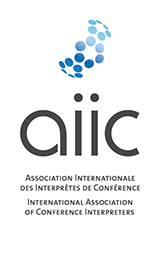Interested in becoming a conference interpreter?
Want to know what conference interpreters do and if you’ve got what it takes? You’ve come to the right place!
Is conference interpreting the right job for you? Do you have the right languages and the right skills? Will you need training? Find out here!
What do conference interpreters do?
Conference interpreters are professional language experts who help people communicate at multilingual meetings (conferences, negotiations, press briefings, seminars, TV broadcasts, etc.), conveying the meaning of a speaker's message orally and in another language to listeners who would not otherwise understand.
Conference interpreters do not do written translation.
Conference interpreters do not just parrot words: they convert ideas expressed in one language (the source language) into another language (the target language).
Conference interpreters interpret "consecutively" (after the speaker has finished speaking) or "simultaneously" (a team of interpreters working in a soundproof booth, interpreting in real-time while the audience in the conference room listens through headsets); and sometimes using "chuchotage" or "whispering" (where the interpreter is in the same room as the participants, providing a whispered interpretation in real-time to a small number of listeners).
Discover the day-to-day lives of working interpreters:
─── Aptitude
Aptitude
Are you an articulate graduate with an excellent knowledge of one or more foreign languages, good general knowledge and a liking for work under pressure? Could you make it as an interpreter?
Do I need training?
Yes! In the early days of the profession, conference interpreters had no formal training, but since 1960, AIIC has recommended formal postgraduate training for anyone wishing to be a conference interpreter.
Training offers the opportunity to learn from professional conference interpreters, who can also help you find your feet on the market after your studies. Formal training also means learning and practising in properly equipped facilities with other like-minded students. Training is invaluable.
Formal training will help you:
── grasp the message carried by a speaker's words
── analyse the relative importance of parts of that message
── remember what you've heard in consecutive
── manage the stress of the job, and
── prepare to join the profession (and more besides).
How training works
Training should be full-time, postgraduate and given by professional conference interpreters, usually in a university environment.
You will need at least one full academic year, more often two.
Albeit not impossible, it is extremely difficult to devote the necessary time and effort to learning to interpret alongside working at another job.

